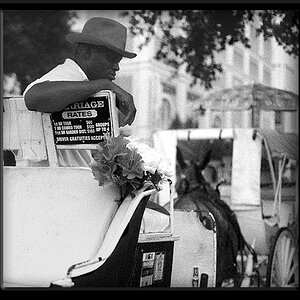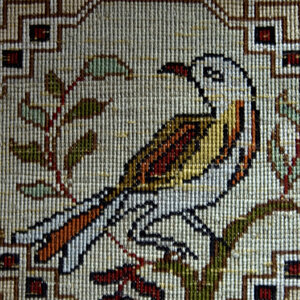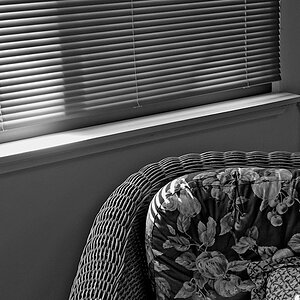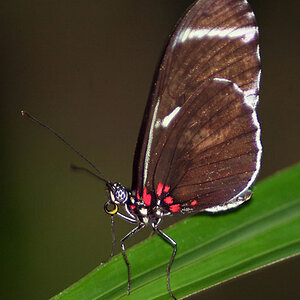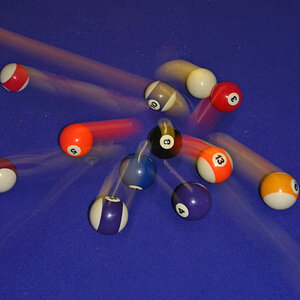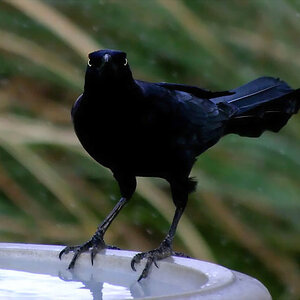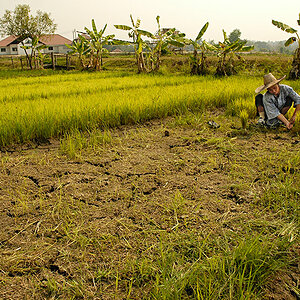Battou
TPF junkie!
- Joined
- May 10, 2007
- Messages
- 8,047
- Reaction score
- 66
- Location
- Slapamonkey, New York
- Website
- www.photo-lucidity.com
- Can others edit my Photos
- Photos NOT OK to edit
Many have asked the question, but how many have gotten the correct answer? What is the correct answer, does it even exist....?
The answer is yes, the correct answer does in fact exist but it differs from person to person. The correct answer can not be found by simply asking the question. You must first answer questions that only you the perspective photographer can answer. Many of these questions lead to more questions and some can not be answered until after you have a camera. All of them will determine how you proceed in the field of photography.
Below you will find the questions you should ask your self first, the possible answers and how to translate these answers.
1-Q.
What do I know?
What do I want to do with a camera?
2-A
What is my time worth to me?
3-A
What is in the budget/can I afford it?
1-Q,
These prices are based on several searches for the various cameras and the lowest average results from several sources including but not limited to B&H and are in USD. It goes with out saying that (not including the single use cameras) all can be purchased as considerably reduced prices by buying used. Also one will generally get what they pay for, in other words you are not likely going to find professional level cameras new at these listed prices, over all average prices are generally higher.
The answer is yes, the correct answer does in fact exist but it differs from person to person. The correct answer can not be found by simply asking the question. You must first answer questions that only you the perspective photographer can answer. Many of these questions lead to more questions and some can not be answered until after you have a camera. All of them will determine how you proceed in the field of photography.
Below you will find the questions you should ask your self first, the possible answers and how to translate these answers.
1-Q.
What do I know?
- 1-Q/Q-1
- Do I know how to use what I know
- 1-Q/Q-2
- Am I willing to learn what I don't?
What do I want to do with a camera?
2-A
- To keep memories.
- to experiment with an art form.
- 2-A/Q-1
- what style?
- 2-A/Q-1
- Non-income use in my regular employment. (Pending employment)
- to supplement my income/to be my income.
- 2-A/Q-2
- in what field?
- 2-A/Q-2
What is my time worth to me?
3-A
- Now
- I can wait and/or take it slowly
What is in the budget/can I afford it?
- 4-Q/Q-1
- Can I afford to have it on a "now" basis?
- 4-Q/Q-2
- Do I need to spread it out over time?
1-Q,
- The first questions are grouped the way they are because one does not need to know a lot about photography to use it. There is more to photography that merely pointing a camera at something and pulling the trigger, for those who know that and are willing to learn more there is no end in learning. With the constant advancements there is always something new, and classes are always available.
For those who don't know a lot about photography they must first decide whether they need to know more or not, see question 2.
- A-1, For those who want little more than tangible memories a simple Point and Shoot camera will suffice. One does not need to know all the intricacies to take these kind of pictures be they the little ones first bath or the first sun set you watched with your spouse. However the answers to 3 and 4 will determine whether digital or film is the way to go.
- A-2, For those who wish to try the art form an SLR is the best choice. There are many artistic things that SLRs can do that Point and shoots simply can not, but this does not rule out point and shoot cameras as tools of the artistic trade, as there are some artistic facets unique to them as well.
One must first decide whether they want to be a P-shooter artist or an SLR artist and again the answers to 3 and 4 will determine whether digital or film is the way to go. The pending answer of question one will also influence this as one can start with one and switch to the other with relative ease. The basic principals are interchangeable between the two. For those willing to learn from the ground up starting with a P&S will not be too hindering, an SLR can always be advanced to later on for furthering of the art form.
For those with a basic knowledge of a cameras workings and willing to learn more an SLR is the best choice for the afore mentioned shortcomings, however switching to P&S is slightly more difficult as one grows accustomed to having the features that P-Shooters do not and tend to over estimate the cameras capabilities (Speaking from experience).
- A-3, There are several jobs where cameras can come into play that are far from photographer class employment such as insurance adjusters, autobody technicians, flower shops staff and so on. Photo requirements differ with these employments, so naturally the job you have and the deadlines will effect this.
Insurance adjusters and the like are generally documenting objects or damage to objects and have short deadlines. There is no need for many different aspects of photography for this. For shots like this a digital point and shoot is the only option. The ability of digital and the immediate return allows for faster processing of whatever the task at hand is to meet the deadlines.
Flower shops and the like - is more DIY product photography. More artistic freedom is required here. (see basic product photography in A-4)
Unless the camera will be provided for you see questions 3 and 4.
- A-4, There are many different photographer class jobs that can be used to make money as well as possible sales of artistic photos. These requirements vary considerably and often require knowledge beyond that of basic photography. So first you must figure out what you want to shoot be it wild life or current events. Many of them have (what could be called) an entry level with room for advancement. Naturally this will all be biased on entry level. Results change as the ladder is climbed and experience is accumulated in the chosen field. Not all photographic jobs will be listed as many have individual branches under different names due to subtle differences including (but not limited to) subject matter.
- Journalism-digital point and shoot will work but digital SLR is the best choice. Entry level into journalism would be ones local paper, for this deadlines are very steep needing the image from location before presses start rolling. The the added flexibility of SLRs range could save your life in dangerous situations. See questions 3 and 4 for P&S or SLR
- Wild life-SLR is the only option. Flexibility of range well beyond that of a P&S zoom is a must. Deadlines vary but seem fairly lax pending application. Again see questions 3 and 4 for film vs.. Digital.
- Basic Portraiture-SLR is the best choice, a point and shoot will work but one is not likely to get many shoot jobs with a tiny P&S on a tripod. Deadlines are flexible and minimal post work is needed for basic portraits, film and digital will perform equally at entry level.
- Basic Product photography-For this a digital SLR is the best option. Pending deadline requirements will determine digital or film, both will perform admirably, but the amount of CG postwork for modern product photography lends strength of convenience to the digital.
- For those who need/want it now and can afford it due to:
- Strict deadlines-Digital SLR-Instant images, flexible range.
- Memories-Digital P&S-Instant sharing with family
- learning Basics-Digital-Instant images, Exif data, restrictions based solely on user preferences
- Flexibility-Film-fast SLR gear accumulation due to price and availability allows for greater range of usable equipment faster
- Those willing to wait/take it slowly or can not afford the "now" luxury
- strict deadlines-Digital P&S or preowned-Instant images at lowest possible cost
- Memories-Film P&S-inexpencive camera, diffused price over a period of time
- Learning Advanced-Film-grater flexibility with equipment availability, The act of documentation aids in remembering facets of photography and exposure creating habit, restrictions applied by default, added incentive of repeating mistakes gets expensive.
- Short Finances-Film-Digital revolution has brought professional level film equipment down to consumer level prices and consumer level film products are bargain basement priced. Better and more gear for the buck.
- Flexibility-Film-equipment availability, Prices of lenses remain stable over the years, bodies however drop dramatically. Over all if you don't like your Nikon you can switch to Canon at a decent price. One can get a body and half a dozen or more lenses at or lower than a new digital body of any major make costs.
- Media Compatibility-Film-One who wishes to switch from one media to the other should start with film, Habits and tendencies developed in film are more accepted by digital than the other way around
- Digital Point and shoot-consumer grade P&S cameras priced starting around $100 New, single use digitals around $11 to $20
- Film Point and shoot-consumer grade P&S cameras priced starting around 45 to $50 new, single use 35mm point and shoot cameras are readily available at any local drug store starting around $5, (I have seen them as low as $3.)
- dSLR-Entry level dSLRs priced starting around $500, New (Body only)-lens prices vary pending body
- SLR-SLRs are readily available starting at around $200, New and/or refurbished (body only)-lens prices vary pending body and mount.
- Printing Contrary to popular belief, Digital prints have a price, unless done at home for reduced quality (or at the cost of serious equipment) One will still be using (required for single use digitals) the same or similar sendout services for digital prints as they would for film processing at similar prices.
These prices are based on several searches for the various cameras and the lowest average results from several sources including but not limited to B&H and are in USD. It goes with out saying that (not including the single use cameras) all can be purchased as considerably reduced prices by buying used. Also one will generally get what they pay for, in other words you are not likely going to find professional level cameras new at these listed prices, over all average prices are generally higher.


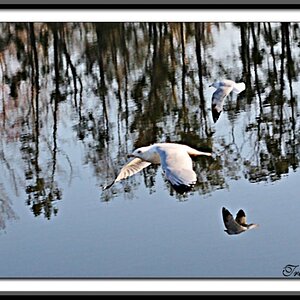
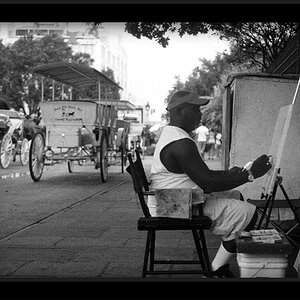
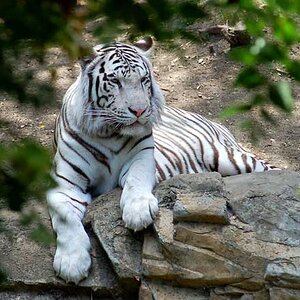
![[No title]](/data/xfmg/thumbnail/37/37104-99933b18ee16678a8299f12747336d48.jpg?1619737882)
